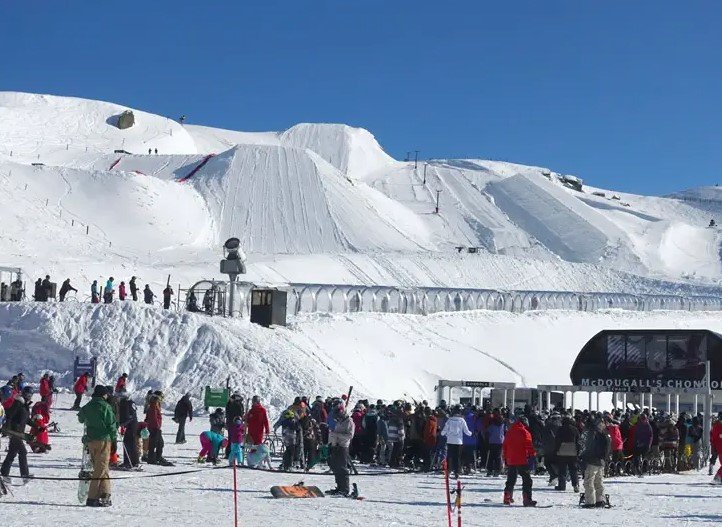The Olympic Council of Asia has confirmed that Saudi Arabia’s preparations for the 2029 Asian Winter Games remain on track, despite recent reports of construction delays at the planned Trojena ski resort in NEOM. This statement comes amid talks of potential replacements like South Korea or China, highlighting ongoing challenges in building a winter sports hub in the desert kingdom.
Event Background and Saudi Bid
Saudi Arabia won the bid to host the 2029 Asian Winter Games in October 2022, a decision made by the Olympic Council of Asia during a meeting in Cambodia. The event will take place in Trojena, a mountain tourism destination within the massive NEOM megacity project.
This choice marked a bold move for the country, known for its hot climate but aiming to diversify its economy through Vision 2030. NEOM, valued at about 500 billion dollars, includes plans for year-round skiing, luxury resorts, and a man-made lake. Officials promised the site would be ready by 2026, three years before the games.
Environmental groups have criticized the project, pointing to high water and energy use in a dry region. Still, supporters see it as a way to boost winter sports in Asia and attract global tourists.
The games will feature events like skiing, snowboarding, and ice hockey, with thousands of athletes from across the continent expected to join.
Recent Reports of Delays
Over the past week, media outlets have raised concerns about progress at Trojena. A major report highlighted struggles with building the ski resort, including issues with installing cables and creating artificial snow in a area that sees little natural snowfall.

Construction teams face tough geography, with mountains that need major changes for ski slopes and facilities. Workers aim to install thousands of cables, but progress has been slow, with only one per day in some cases.
These setbacks have sparked talks about moving the event. Saudi officials have reportedly reached out to other nations to explore options, as the original timeline feels tight with less than four years left.
Despite this, local teams continue excavation and infrastructure work, as shown in recent updates from the region.
Olympic Council Response
The Olympic Council of Asia released a statement on Sunday, affirming that everything is moving forward as planned. They praised the local organizing committee for strong progress and close monitoring.
Council leaders expressed excitement about Trojena as a new winter sports spot in Asia. They noted the bold vision and its potential to create lasting opportunities for the sport.
This response aimed to calm worries after news of possible changes. The council has visited the site multiple times and reports satisfaction with the pace.
- Key points from the OCA statement:
- Preparations are on schedule.
- Strong progress noted in construction.
- Appreciation for the ambitious venue plans.
- Focus on future benefits for Asian winter sports.
Potential Replacement Hosts
South Korea and China have come up as possible stand-ins if Saudi Arabia steps back. Both countries have recent experience with big winter events.
South Korea hosted the 2018 Winter Olympics in Pyeongchang, which drew praise for smooth operations and modern venues. China held the 2022 Winter Olympics in Beijing and the Asian Winter Games in Harbin earlier this year.
Officials from these nations have been approached, according to reports. South Korea’s sports committee confirmed informal talks, while China’s foreign ministry said they had not heard of any formal request.
If a switch happens, it could delay Saudi Arabia’s plans to 2033 or later. This would be a setback for the kingdom’s push to become a sports powerhouse, after securing the 2034 FIFA World Cup.
| Potential Hosts | Past Events | Strengths |
|---|---|---|
| South Korea | 2018 Winter Olympics | Proven infrastructure, experienced teams |
| China | 2022 Winter Olympics, 2024 Asian Winter Games | Recent hosting success, large venues |
| Saudi Arabia (Original) | None yet | Innovative desert resort, economic boost |
Challenges and Broader Impact
Building Trojena involves complex engineering, like creating ski runs on hotel rooftops and a massive freshwater lake. The project tests Saudi Arabia’s Vision 2030 goals, led by Crown Prince Mohammed bin Salman, to shift away from oil reliance.
Funding issues and a tough timeline add pressure. Recent global events, such as supply chain problems from the pandemic, have slowed similar large projects worldwide.
Yet, progress continues, with snow seen in nearby Tabuk mountains last winter, offering hope for natural elements. Experts say the games could inspire more winter sports in warm climates if successful.
On the flip side, failure might hurt Saudi Arabia’s image in global sports. Other nations watch closely, as the kingdom invests billions in events like Formula One races and golf tours.
Looking Ahead
As the 2029 date nears, all eyes stay on NEOM’s development. The Olympic Council plans more updates, and Saudi teams work to meet deadlines.
This situation shows the risks of ambitious projects but also the potential rewards. Winter games in the desert could change how people view sports hosting.
Share your thoughts on whether Saudi Arabia can pull this off, or if a replacement makes sense. Comment below and spread the word to keep the discussion going.
